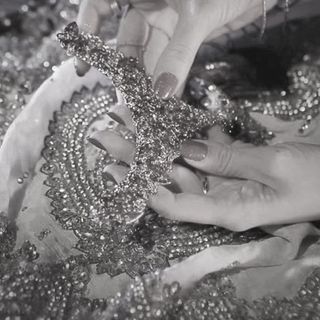
Keeping My Last Name After Marriage Was Inevitable, But Not Easy
A writer wonders why women still have to negotiate their identities.

Few months ago, after many of us had finished vicariously participating in Sonam Kapoor’s wedding, her decision to change her name to SonamKAhuja on her Instagram handle — and that, too, within 24 hours of being married — drew much criticism. If she is a self-declared feminist with open-minded sensibilities, then why so the need to take on her husband’s name? “The whole idea of feminism is to have equal opportunities and the choice to do what you want to do. So, whether I want to or do not want to change my name is my choice,” she said at the time, adding that no one had noticed her husband had changed his name, too, by incorporating an S as his middle name.
While that is a crucial point — that it is her prerogative whether to rename herself or not — the question remains: Why is it that women are still having to negotiate something as fundamental as changing their name (or not) upon getting married?
Long before I got married, I had made the decision that I would neither change my surname, nor append it with that of my husband; my surname was inextricably entwined with my identity as a writer and creative person, and was, therefore, me. In college, I had become aware of several instances of full re-naming of women, following marriage, in my own families. I wondered at the double erasure of both the first and surnames, the excising all that these women had once been before marriage, as if they had never existed beforehand. “How dare they change her names,” I, newly-fed on feminist theories, had thundered. “How dare she have her named changed?”
Yet, a few months before I got married, I was talking to my then-fiance, now husband, about surnames. “I hope it is okay with you if I retain my surname?” I asked, and he had replied: It is your name, you can do as you wish with it. I then thought nothing more of the conversation, and it was only after I got married, in fact, that I questioned why I had had it in the first place. Why had I felt the need to seek his permission to handle that which was, and had always been, essentially mine: my name?
The decision, as it neared, suddenly felt more complicated, entailing a negotiation with myself and all that I had been brought up to believe. Had I not been conditioned as a woman — by society, family, and media for years — to see marriage as an inevitable and formative transition to adulthood? When people spoke of women settling down, as if they were errant grains in a glass of otherwise clear water, I internalised that notion, aspired to it. However, I also believed that a marriage sanctifies a balanced bond, creates a universe in which there are two, equal inhabitants – and I fully intended my marriage to be and remain that way. For me, retaining my name would be my way of finding joy in marriage while resisting being subsumed by it.
Whenever I announced my decision, both men and women would immediately ask if I had forgotten that the very surname I so stubbornly and feminist-ly refused to renounce was that of my father, i.e., another man? Wasn’t it denoting that my identity was still defined by patriarchy? I found myself struggling to formulate an apt response even after marriage, for years. (I hadn’t yet read Nivedita Menon’s book, Seeing Like A Feminist, in which she unpacks the assumption that a man’s surname is his own, not his father’s, while a woman’s surname always remains her father’s: “By not changing her surname, a woman is simply choosing their own father’s name over her husband’s father’s name,” Menon writes.)
If a name is identity, identity is space – and let’s face it, space is in scarcity for women.
One of the first things I did after I got married was to change my surname on Facebook: Priyanka Sacheti became Priyanka Sacheti-Mehta. “Look, look, I am married,” the name-change said for an audience of my friends, family acquaintances, and we-met-once-but-are-still-Facebook-friends. I had been looking forward to marriage and being married, but my desire to broadcast it so quickly and urgently to the world took me by surprise.
I have been married for five and a half years, now, and the experience has irrevocably and wonderfully changed me, like it has for countless men and women. Yet, it is the re-naming – however brief and temporary and accidental – which makes me metamorphose into a woman I do not recognise, as if I am glimpsing myself in the mirror and unable to place who it is that stares back: a woman existing outside of any time and space I know.
If a name is identity, identity is space – and let’s face it, space is in scarcity for women, whether it is their right to public space or the circumscribed nature in which they are compelled to move and exist in all walks of life. As a married woman, I was being granted access to additional space simply by virtue of being married – at once a privilege and a constraint. Yet, I wasn’t willing to sacrifice the space that I had created for myself through my name, space that was neither privilege nor constraint – rather, a right.
After all these years of marriage, and stubbornly and proudly exercising my surname, I still — stubbornly and proudly — haven’t changed my name on Facebook, though I am Priyanka Sacheti on the two other social media handles I use most regularly. I do wonder what fundamental difference there is between Priyanka Sacheti and Priyanka Sacheti-Mehta. The truth is, there is a difference, even if I am the only one who is aware of and appreciates it: Scanning the map that is my life, I can easily and always locate Priyanka Sacheti upon it: it is my home, space, address. If Priyanka Sacheti-Mehta is another country, Priyanka Mehta is an entirely alien continent altogether. In a world where I often feel like a nomad, restlessly moving from one place to another, wondering whether I belong anywhere, my name is truly where I come to rest. And it is my right alone to shape it as I wish – just as it is for every woman.
Priyanka Sacheti is a writer based in Bangalore, India. Raised in Oman and educated in United Kingdom, she has been been published in The Guardian, Art Slant, Adventure, Gulf News, and Brownbook, among others. She is presently an editor at Mashallah News. Her literary work has appeared in various literary journals and anthologies. She tweets @priyankasacheti1 and collects her writing at priyankasacheti.contently.com.
Related


India Has A Greater Percentage of Female Pilots Than Anywhere Else in the World
